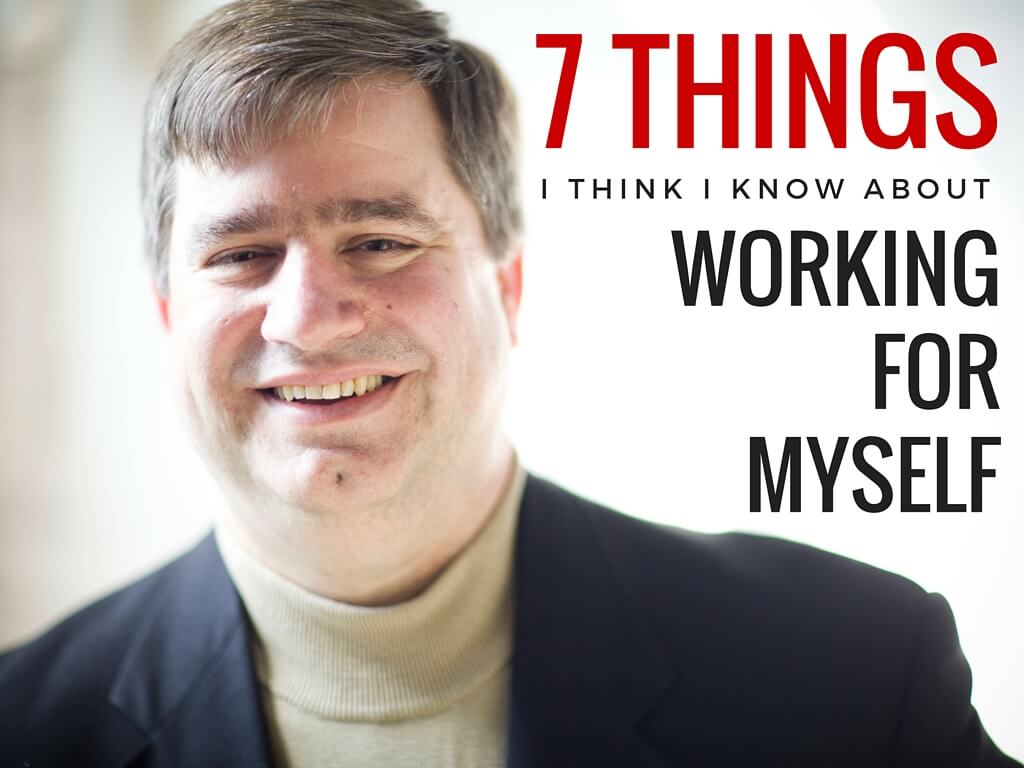What (I think) I know about working for yourself; 15 years in
It was April 2001. I was 35 years old, and I was done with corporate life. I had spent over a decade living in airports, sleeping in rooms at the Courtyard by Marriott™, and meeting in conference rooms that were out of state. I was tired of it. I made the choice to step out on my own. I didn’t know much about being self-employed at the time (and maybe I still don’t), but I was determined to figure it out. Now—15 years later—I think I know a few things.

1. The early years are hard.
Getting a business started takes a lot of work (it didn’t help that I didn’t know what I was doing)! There were so many decisions to make (that I had never made before), and everything cost money (more than I thought or than I had to spend). It felt like I was in a race against time, only I had no idea where the finish line was.
I know now that the constant drive and churn of those early years was really costly for my body, my relationships and my spirit. If I had it to do over again, I’d have worried less about “scale” and more about sustainability.
2. Hindsight is 20–20 (sometimes even OTHER people’s hindsight).
There are some practices that gain value over time, so learn from me, and start those early! A great example is creating an email list. Why would you do that when you have 30 people in your database? Because the only way that is going to grow is with time; and the only way you find out how to engage your audience, and what kind of content works, is by DOING IT. So the sooner you start it, the better you’ll get, and the faster your list will grow.
Other things that you’ll wish you started sooner include: having a solid peer group that you meet with regularly, tracking your business data, and establishing key performance indicators. It seems weird to track your leads when you have only 5—and of those you don’t think ANY of them are good—but once you’ve got a year’s worth(or two, or ten) of data, it becomes really valuable.
3. It is about who you know; so get to know a lot of people.
They say it’s not what you know, it’s who you know. That’s very true, but not in the way that I first thought. Early on I tried to get connected to important and prominent people, people who could give me a “boost”. But later on I learned that’s not how it (usually) works. If you get to know your peers, the folks who are also in the early stages of their business, then as they grow (and you grow) you can help one another. Then 15 years later you know folks who are important and prominent people, you’ve helped them get there. That will give you a boost!
4. Life (and business) is unpredictable.
If your business plan hinges on you never getting sick, or needing a day off, on your customers all paying you and your employees never taking off at inopportune times, then it’s not a very good plan. Stuff happens. It’s far better to have some margin, some room in your plan for things to go wrong, so that those “bumps” don’t become catastrophes. Your back up plans need to have back up plans (which is not to say planning for every worst case scenario); it means knowing what your options are and having the resources to use those options when you need them. Usually there’s a way out, it’s just a kind of expensive way.
5. So keep extra cash on hand (and avoid debt)!
They say that if money solves your problems then you don’t really have problems. But if you have money, and can use it to solve “issues” that come up, it makes life a lot easier. It gives you more options for navigating the inevitable mistakes, downturns and catastrophes. What’s “extra cash” mean? The dollar amount is different for everyone; but I think I can safely say, “more than you think you’ll need” is what you should aim for.
One thing that I learned when things got tight in 2008, is that folks that had extra cash on hand found some terrific opportunities; and those who were in debt got *crushed*. Banks happily loan you money when you don’t need it too badly, but if they get short, or if your business has some distress, they want it all back—right away. That can be crushing to a small business. So my advice is to avoid borrowing as long as possible.
6. You absolutely can’t “go it alone”.
Running your own business is lonely, and the bigger your business gets the lonelier it is. There’s no one to celebrate with when something goes great, there’s no one to pick you up when things are terrible. There are going to be lots of times when you feel betrayed by clients, employees, even business partners that you thought were solid. In the midst of that, it’s easy to lose your bearings and start to think that the world is against you, or that you have a ”kick me” sign on your back. This is when you need friends. Friends are folks outside your business who can listen and remind you of all that’s great about your life. Yes, friends. Outside your business…
7. But that doesn’t mean you need a “partner”.
Sometimes people think that it will be less lonely when you have a partner— someone who’s ”in it“ with you—and that certainly can be true. Those early years can be easier if you can ”divide and conquer”; that’s when partners are great. I’ve noticed however, that lots of partners find that as the business grows, they aren’t exactly “in it” together. The partners sometimes have different needs, or different time horizons. One wants to invest in growing the business, the other wants to take more cash out for retirement…
Partnerships are hard. Enter into them with caution and only with someone you know well. And always have a way out!
This journey of owning a business has been challenging and rewarding. It continues to push me to new places of growth and maturity. I can’t wait to see what the next 15 years have for me.
